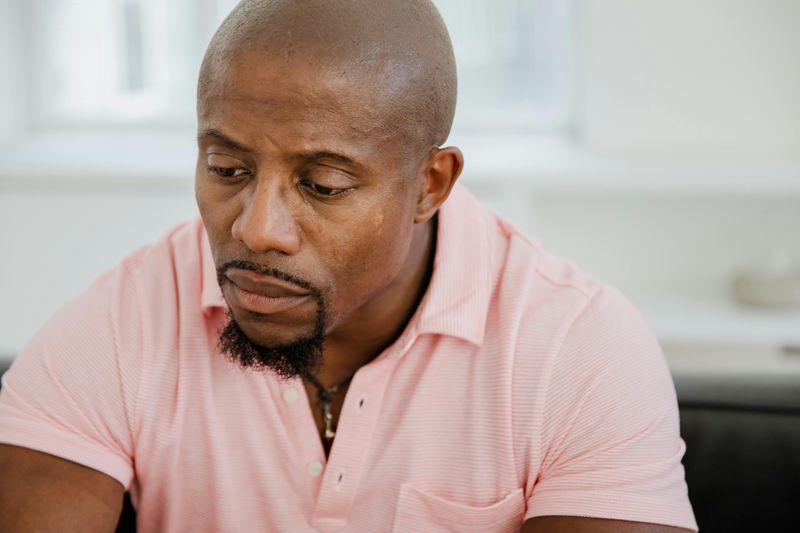Some men find it incredibly hard to share their feelings, and it’s not because they don’t care or don’t feel deeply. Many were raised with messages that told them emotions are a weakness and that real men should always stay strong.
This kind of upbringing leaves lasting marks that show up in relationships, conversations, and everyday moments. Understanding these signs can help you see past the walls he’s built and recognize the conditioning behind his silence.
1. He Shuts Down When Things Get Emotional
When tension rises, he goes silent or walks away instead of engaging. His body language closes off, and suddenly the conversation is over before it really began. You might feel frustrated, but for him, this retreat is automatic.
He learned early that showing emotion equals weakness, so shutting down feels safer than vulnerability.
It’s not that he doesn’t care. His silence is a shield he was taught to carry, even when it keeps people at arm’s length.
2. He Jokes When He’s Hurting
Humor is his armor. He’ll make a joke out of pain to deflect attention, turning serious moments into punchlines. If something bothers him deeply, expect a sarcastic comment or a self-deprecating laugh instead of honesty.
Deflection is a self-soothing mechanism—a way to stay “strong” without admitting he’s struggling. For boys raised to hide their pain, comedy becomes the only acceptable outlet. It keeps others from asking too many questions.
Behind the humor is often real hurt. When he laughs off his struggles, he’s protecting himself the only way he knows how.
3. He Struggles to Say “I Need Help”
He’ll power through exhaustion, stress, or burnout rather than ask for support. Even when he’s drowning, he’ll insist he’s fine and wave off offers of assistance. Asking for help feels like admitting defeat.
Dependence was framed as failure, so self-reliance became his only safe identity. Many men grow up believing they must handle everything alone to prove their worth. Needing someone else challenges that core belief.
4. He’s Hyper-Responsible
He feels like he has to hold everything together—emotionally, financially, or physically. Every problem lands on his shoulders, and he rarely delegates or admits when the weight is too much.
“Be the man” conditioning often breeds perfectionism and silent pressure to fix everything. From a young age, he heard that men are providers and protectors, no matter the cost.
This constant pressure can lead to burnout. His hyper-responsibility isn’t confidence—it’s a burden he was told he must carry to be worthy.
5. He’s More Comfortable Expressing Anger Than Sadness
Frustration leaks out where tears can’t. When something hurts him, anger surfaces instead of sadness. He might snap over small things or seem irritable when he’s actually feeling heartbroken or scared.
Boys often learn that anger is “acceptable masculinity,” while sadness is shameful. Crying or admitting pain gets labeled as weakness, but anger gets a pass. Over time, all difficult emotions get funneled into frustration.
Beneath the surface, there’s often grief, fear, or loneliness that he was never taught how to express safely.
6. He Struggles With Compliments or Emotional Praise
He brushes off affection, jokes about it, or changes the subject. Tell him something heartfelt, and he’ll deflect immediately. Compliments seem to make him squirm more than smile.
Vulnerability—even in the form of praise—feels unfamiliar, even unsafe. Men conditioned to “man up” rarely receive emotional affirmation growing up. When it finally comes, they don’t know how to process it.
His discomfort isn’t rejection of you. Accepting kindness requires letting his guard down, and that’s territory he’s been taught to avoid at all costs.
7. He Overanalyzes His Emotions
When he does open up, it’s logical, not emotional. Everything gets filtered through his mind before it reaches his heart.
He intellectualizes to control emotion—because losing control once got him labeled “too sensitive.” By analyzing his emotions, he keeps them at a manageable distance.
This approach protects him but also disconnects him. His need to understand every feeling before expressing it means authenticity often gets lost in translation.
8. He Needs to “Fix” Everything
When you share a problem, he jumps into solution mode instead of listening. He interrupts with advice, suggestions, and action plans before you’ve even finished speaking. Empathy takes a backseat to problem-solving.
He equates love with action—not empathy. Fixing makes him feel useful, because feelings make him feel helpless. Men taught to “man up” learn that value comes from doing, not from simply being present.
His instinct to fix isn’t dismissive. It’s his way of showing he cares, even if what you really need is just someone to listen.
9. He Avoids Conflict by Shutting Down
He hates confrontation—not because he doesn’t care, but because conflict triggers deep discomfort. Arguments feel dangerous, so he withdraws to protect himself.
He associates strong emotion with danger or rejection, not connection. Growing up, emotional expression may have led to punishment, criticism, or being told to stop overreacting. Now, conflict feels like a threat.
His avoidance isn’t indifference. It’s a learned response to environments where expressing feelings came with consequences he couldn’t handle.
10. He Has a Hard Time Naming His Feelings
Ask him how he feels, and he might say, “I don’t know”—and mean it. Identifying emotions beyond “fine” or “angry” feels impossible. His emotional vocabulary is limited, not by choice, but by lack of practice.
Emotional vocabulary was never taught to him; he’s fluent in logic, not vulnerability. Boys who grow up hearing “stop crying” or “get over it” never learn words for sadness, fear, or disappointment. They learn silence instead.
His struggle isn’t stubbornness. It’s genuinely not knowing how to articulate what’s happening inside him.
11. He Shows Love Through Actions, Not Words
He fixes your car, checks your tires, or brings you coffee—but rarely says, “I love you.” His affection comes through gestures, not declarations. Acts of service are his primary love language, whether he realizes it or not.
He expresses care through doing, because that’s how he was taught men should love. Words felt too vulnerable, but actions proved worth. Providing and protecting became his way of showing he cares deeply.











